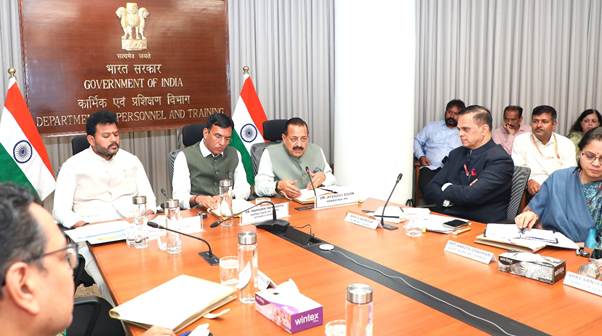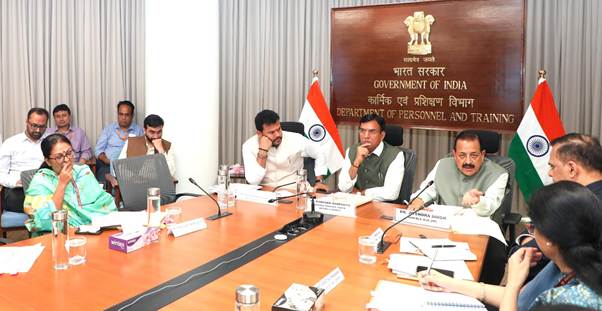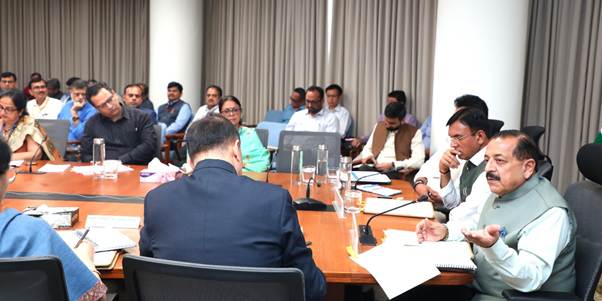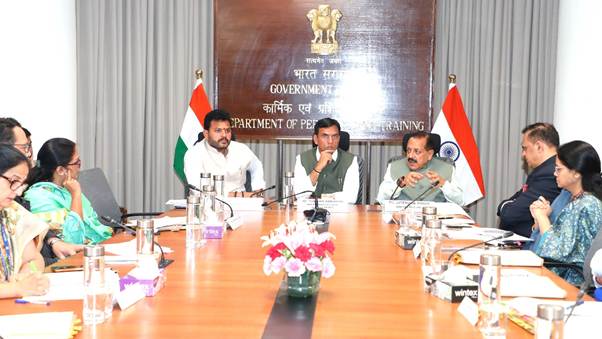Ministry of Personnel, Public Grievances & Pensions
In last 3 weeks, under 'Special Swachhata Campaign 5.0' Over 5.5 Lakh Sites Covered, ₹387 Crore Earned, 148 Lakh Sq. Ft. Space Freed
Dr. Jitendra Singh Highlights ‘Waste to Wealth’ as Next Frontier of Swachhata Movement; as Ministries Adopt Best Practices Nationwide
Special SwachhataCampaign 5.0 Becomes Model of Clean Governance, gradually becoming a part of our social behaviour: Dr. Jitendra Singh Says ‘Swachhata Now a Year-Round Administrative Ethos’
Posted On:
28 OCT 2025 8:17PM by PIB Delhi
The "Special Swachhata Campaign 5.0" was reviewed today by a Group of Ministers comprising Dr. Jitendra Singh, Union Minister of State (Independent Charge) for Science and Technology; Earth Sciences; and Minister of State for PMO, Personnel, Public Grievances, Pensions, Atomic Energy, and Space; Dr. Mansukh Mandaviya, Minister of Youth Affairs; and Shri Rammohan Naidu, Minister for Civil Aviation. The high-level review held here today focused on assessing the progress of cleanliness drives, file disposal, and innovative Waste to Wealth practices being implemented across Ministries and Departments under Special Campaign 5.0.
Union Minister Dr. Jitendra Singh said the government’s cleanliness drive has matured into a transformative national movement that blends swachhata with efficiency, transparency, and innovation. He emphasized that Special Campaign 5.0, which began on October 2, 2025, and will culminate on October 31, 2025, marks a decisive step in institutionalizing cleanliness and record management across government offices. “Each version of this campaign has taken us to the next level — from file disposal to freeing up office space, and now, to turning waste into wealth. What began as a cleanliness initiative has evolved into a behavioral and economic reform,” he remarked.
Sharing the latest figures, Dr. Jitendra Singh informed that against a target of 7.56 lakh sites, Ministries and Departments have already covered 5.57 lakh sites, achieving 73.7% progress by October 27, 2025. So far, the campaign has generated ₹387.4 crore in revenue through disposal of scrap and e-waste, freed 148.19 lakh square feet of space, and weeded out 19.21 lakh files against the set targets. Public grievances redressal has reached 5.51 lakh cases disposed of out of a target of 7.04 lakh, while 12,402 appeals have been addressed out of 17,402 targeted.
Since its inception in 2021, the cumulative outcomes of the Special Campaign series have been substantial — covering 19.61 lakh cleanliness sites, freeing 844.46 lakh sq. ft. of office space, closing, or weeding out 157.07 lakh files, and earning ₹3,684 crore in revenue for the government.
Dr. Jitendra Singh said these achievements reflect not just administrative efficiency but also innovative thinking within government institutions. He drew attention to new models being implemented under the Waste to Wealth initiative, such as AIIMS’s experiment in recycling bio-laboratory waste into reusable material, and the conversion of used cooking oil into low-cost fuel through NGO partnerships. “These are models of sustainability that also offer economic and social benefits. Our goal is to make waste management a part of our daily administrative and civic behavior,” he said.
He also highlighted the collaboration between Tata Steel and government agencies in using steel plant by-products for eco-friendly road construction in regions like Surat, Arunachal Pradesh, and Murai. “Such practices demonstrate how the private sector can contribute meaningfully to sustainable development,” he added.
The Minister noted that the Ministry of Science and Technology and DARPG are documenting best practices from across Ministries — from “Waste to Art” installations, such as scrap sculptures of Chardham temples by the Ministry of Coal, to innovative cleanliness projects by the Ministry of Railways and Culture. These, he said, serve as examples of creativity and civic pride in government workplaces.
Dr. Jitendra Singh further stated that over 77 Ministries/Departments have updated achievement data on the campaign portal, with 84 Ministries/Departments having set measurable targets. The campaign has also seen strong communication outreach— 13,780 tweets, 207 PIB statements, and multiple panel discussions on DD News, Sansad TV, and All India Radio — ensuring nationwide engagement and visibility.
Calling for sustained efforts beyond October 31, Dr. Jitendra Singh urged Ministries to adopt successful models and maintain cleanliness, efficiency, and grievance redressal as year-round priorities. “We are institutionalizing swachhata not as a symbolic exercise but as an ethos of governance. The ‘Waste to Wealth’ movement must now become part of our administrative DNA — where cleanliness, productivity, and innovation go hand in hand,” he said.
He concluded by reiterating that the Special Campaign complements the Prime Minister’s vision of Minimum Government, Maximum Governance, emphasizing that a clean and efficient government system is essential for a transparent and citizen-centric administration.
Mr. V. Srinivas, Secretary, Department of Administrative Reforms and Public Grievances (DARPG), who is the nodal officer for the Special Campaign 5.0, presented a detailed status report on the progress achieved so far and the ongoing activities across Ministries and Departments. The meeting was also attended by nodal officers from various Ministries and Departments who briefed the Group of Ministers on the status and best practices of their respective departments under the campaign.
The Special Campaign for Disposal of Pending Matters (SCDPM), launched in 2021 under the Department of Administrative Reforms and Public Grievances (DARPG), continues to drive cleanliness, efficiency, and accountability across all Ministries and Departments.




*****
NKR/AK
(Release ID: 2183516)
Visitor Counter : 431